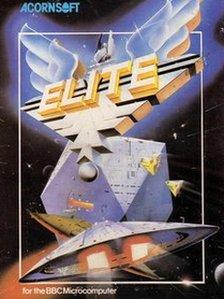Elite reborn
- Published
- comments
Rory Cellan-Jones talks to Elite co-creator David Braban in his Cambridge offices
Thirty years ago a young man called David Braben arrived at Jesus College, Cambridge to study Natural Sciences. But he ended up spending most of his time building a video game with another undergraduate, Ian Bell.
What they built was a 3D space trading game called Elite. It was unlike just about every other game - "It didn't have a score, it didn't have three lives, you had to play it for a long time," says Braben - and proved to be a landmark for the young video games industry.
Three decades on, David Braben is still in Cambridge, and his company Frontier is unveiling something that will excite tens of thousands of 40-somethings who played Elite on the BBC Micro many years ago.
Elite Dangerous is the seminal game reimagined for the 21st Century - but it will only be built if it finds an audience first. The crowdfunding site Kickstarter is being used to attempt to raise the £1.25m needed to bring the game out in 18 months' time. If the quest succeeds it will be evidence of how the industry has changed again.
Back in the 1980s, bedroom developers like Braben and Bell could get a game off the ground for virtually nothing - though they needed a publisher to get it to the paying public. A chapter in a new and engrossing history of the UK games industry, Grand Thieves and Tomb Raiders, external, gives an account of the birth of Elite.
We see Braben and Bell trying initially to sell it to the entertainment conglomerate Thorn EMI but there is a clash of cultures. "In EMI's world, entertainment arrived in three-minute consumable chunks and it saw computer games in the same way." Instead they end up with the Cambridge business Acornsoft, born out of the computer firm behind the BBC Micro - and their games sell as many copies as the Micro itself, or more.

The first version of Elite was published on a cassette tape
Nowadays, David Braben's Frontier operates in an industry dominated by giant entertainment and technology conglomerates, from Sony to Vivendi to Microsoft, and it can be hugely expensive to create a new product. Look at Halo 4, which comes out this week and is rumoured to have cost Microsoft $100m to develop.
And for smaller independent players, having a relationship with the giants has been the only way to get to market. But that is changing. Casual games and mobile apps provide a new route for small firms - or even bedroom coders - to reach a global audience at high speed with a smaller outlay. And then there's Kickstarter.
The crowdfunding site which has just arrived in the UK promises an interesting new business model for the games industry. When I met David Braben in Frontier's offices last week he was excited about what it could offer: "What's very exciting about it is it brings the funding directly from the people who are going to play it," he explained. "We don't have a publisher in between who's saying what is the target market - the target market are the people who sign up for the game."
It wasn't immediately clear to me why, with all the credibility he has built up over the years, he couldn't go to a publisher with Elite Dangerous. "The current publishing process isn't very friendly to those sort of games," he explained. "It's the sort of game which is very hard to make through the traditional publishing process - because publishers want to see the end result before they move forward. The sort of games that do get made tend to be sequels to games that have been very recently successful so you get lots of games that look the same."
Now, although I got a glimpse of some early work on the game by the small development team, there is no guarantee that Elite will be reborn. David Braben is asking for a large sum for a game that won't be ready for 18 months - by which time the games world will have changed again. Maybe he has overestimated the size of his potential audience or their appetite to hand over cash in advance.
But given the popularity of a number of other gaming ideas on Kickstarter that seems unlikely. Ouya, a tiny Android based video games console, external, has proved the most successful project so far, raising nearly $9m. Perhaps the rebirth of a British video game classic can break that record.